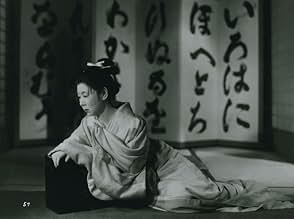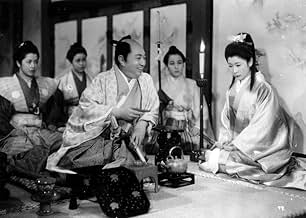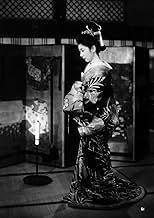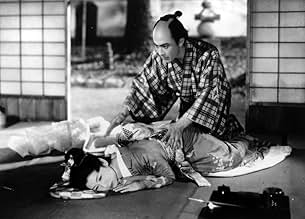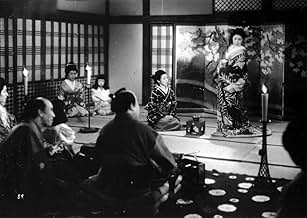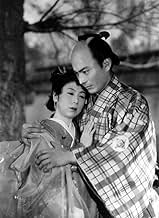AVALIAÇÃO DA IMDb
8,1/10
8,1 mil
SUA AVALIAÇÃO
Segue a luta e sobrevivência de uma mulher em meio às vicissitudes da vida e a crueldade da sociedade.Segue a luta e sobrevivência de uma mulher em meio às vicissitudes da vida e a crueldade da sociedade.Segue a luta e sobrevivência de uma mulher em meio às vicissitudes da vida e a crueldade da sociedade.
- Direção
- Roteiristas
- Artistas
- Prêmios
- 2 vitórias e 1 indicação no total
Akira Oizumi
- Manager Bunkichi
- (as Hiroshi Oizumi)
- Direção
- Roteiristas
- Elenco e equipe completos
- Produção, bilheteria e muito mais no IMDbPro
Avaliações em destaque
I finally saw Life of Oharu at the Ontario Cinematheque in Toronto last night and what an amazing film it was.
I don't know why I held out on Mizoguchi for so long. I think it's because I watched a lot of Ozu in the day and expected more of the same heavily restrained, obliquely symbolic style which is often as alienating as it is inventive. I couldn't have been further off the mark. Mizoguchi's style is fluid and assured like Hitchcock and Bresson. He also injects a warmth of spirit and shows a genuine interest in storytelling which is often absent in much of Ozu's ouevre.
The Story of Oharu is a treatise on how women are economically exploited in a patriarchal society. This is probably one of the greatest 'women's films' ever made. It ranks above 'Breaking The Waves' and Sirk's 'Imitation of Life'. No small feat!! If you like stories that actually say something about the world in which we live, I would strongly recommend this film. It's a masterpiece of world cinema. I am definitely going to see more Mizoguchi.
I don't know why I held out on Mizoguchi for so long. I think it's because I watched a lot of Ozu in the day and expected more of the same heavily restrained, obliquely symbolic style which is often as alienating as it is inventive. I couldn't have been further off the mark. Mizoguchi's style is fluid and assured like Hitchcock and Bresson. He also injects a warmth of spirit and shows a genuine interest in storytelling which is often absent in much of Ozu's ouevre.
The Story of Oharu is a treatise on how women are economically exploited in a patriarchal society. This is probably one of the greatest 'women's films' ever made. It ranks above 'Breaking The Waves' and Sirk's 'Imitation of Life'. No small feat!! If you like stories that actually say something about the world in which we live, I would strongly recommend this film. It's a masterpiece of world cinema. I am definitely going to see more Mizoguchi.
10rbiko-1
I cannot agree with the reviewer who commented that Mizoguchi does not have the aesthetic sensibility of Kurosawa or Ozu. In fact, he appears to me to be the true master of Japanese cinema. 'Oharu' is a marvellous achievement - a compassionate, beautiful account of a quite astonishing fall from privilege and grace into destitution and despair. It is unremittingly bleak and yet due to Mizoguchi's genius and Kinuyo Tanaka's luminous portrayal of the unlucky Oharu, it is a spiritually compelling work, with sheer artistry and simple human empathy competing for our attention in every take. Breathtaking film-making of the highest quality.
Mizoguchi's empathy for female characters is legendary. The Life of Oharu is one outstanding example. One woman's journey from member of the imperial court to elderly streetwalker is narrated in exquisite, shimmering, painful style. Oharu (Kinuyo Tanaka) is seduced by a man below her station. Her crime is to love the man back unreservedly. That action becomes the catalyst for a series of degradations punctuated by false dawns, as Oharu's life spirals to rock bottom. And as bleak and depressing as that sounds, Mizoguchi's storytelling, combined with Tanaka's dignified portrayal, make this film cathartic, a tragedy with a small, life-affirming message at its heart. It is a cautionary tale to the follies of social mores, and the burden that women through the ages have to endure. More than that, it is a tale of one woman's dignity through the most humiliating of circumstances. Stunning.
It was sickening to witness how Ohara was treated by the noble men of high rank and even by her father. She is a strong and proud woman, but she has a series of misfortunes of things she could not very well control herself. Because of her looks, her pride and her birth she is put, mostly by force, into various agreements that are disgrading and she meets little compassion.
That said, as this is based on a novel by Iharu Saikaku, it has strong tendencies towards being epic in approach. This is not a bad thing, but it takes on being a fairytale almost instead of gaining credibility like say 'Donzoko' by Kurosawa. For emotional impact Mizoguchi is an absolute master however and this tragic tale could not be outdone by any other.
That said, as this is based on a novel by Iharu Saikaku, it has strong tendencies towards being epic in approach. This is not a bad thing, but it takes on being a fairytale almost instead of gaining credibility like say 'Donzoko' by Kurosawa. For emotional impact Mizoguchi is an absolute master however and this tragic tale could not be outdone by any other.
a fifty-year old prostitute in Japan has to live in poverty, because no man is interested in her services. She visits a temple and one of the statues resembles the young Samurai, with whom her decline began. Being a noble's daughter she was not allowed to marry him, he was executed and she and her family were expelled from the court. Thereafter one misfortune follows the other. All of her attempts to lead an honest and happy life fail. The film is set in beautiful Japanese landscape and architecture, in which the action of the is arranged with great care. You can feel the inhuman rigor of feudal society and court etiquette. Nevertheless, the aesthetic quality if the films is slightly lower than those of Ozu's and Kurosawa's films. A highly recommendable movie though(8).
Você sabia?
- CuriosidadesThis film, which was director Kenji Mizoguchi's dream project, was severely under-financed, and the production was forced to use a warehouse instead of a regular sound stage. This warehouse happened to be located near railways, and each time a train passed by, they had to stop shooting, which made the shooting of the film even more difficult with the director's obsessive use of long, continuous, uninterrupted takes. The same warehouse was also used for Josef Von Sternberg's film 'The Saga of Anatahan'.
- Citações
Katsunosuke: Lady Oharu, a human being - no, woman - can only be happy if she marries for love. Rank and money don't mean happiness.
- Cenas durante ou pós-créditosOpening credits shown over Japanese artwork/water-colors.
- ConexõesFeatured in Écoute voir... (1978)
Principais escolhas
Faça login para avaliar e ver a lista de recomendações personalizadas
- How long is The Life of Oharu?Fornecido pela Alexa
Detalhes
Bilheteria
- Faturamento bruto mundial
- US$ 6.921
- Tempo de duração
- 2 h 28 min(148 min)
- Cor
- Mixagem de som
- Proporção
- 1.37 : 1
Contribua para esta página
Sugerir uma alteração ou adicionar conteúdo ausente

